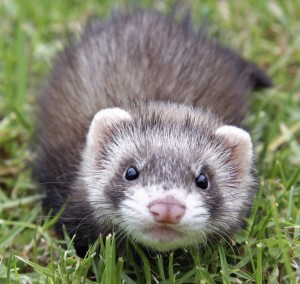Pocket Pet Care 101: Household Dangers, Health Risks, and Sanitation | Volunteer Veterinary Hospital
 Have you ever seen a guinea pig demonstrate his or her popcorn moves, or a ferret show off their instinctual war dance? These animals – among others in the aptly named group known as “pocket pets” – may be small, but their charming personalities are anything but.
Have you ever seen a guinea pig demonstrate his or her popcorn moves, or a ferret show off their instinctual war dance? These animals – among others in the aptly named group known as “pocket pets” – may be small, but their charming personalities are anything but.
While pocket pets are certainly entertaining, each animal deserves to have their individual health needs recognized and met. Responsible pocket pet care should be fun for both you and your pet, and when it comes down to providing a safe, healthy, and comfortable life for whichever pint-sized pet you choose, we’ve got you covered.
Starting Out
Pocket pets deserve the same care as our feline and canine patients, and we happily extend similar veterinary diagnostic and treatment services, dental care, nutritional guidance, and pocket pet wellness care. Ferrets, rabbits, and members of the rodent family such as rats, mice, chinchillas, hamsters, gerbils, and guinea pigs typically have shorter lifespans than other household pets, and this necessitates routine wellness checks at least once a year.
Household Dangers
True to his or her very nature, your pocket pet is designed to squeeze into and through tight spaces. Keep your windows and doors closed when your pocket pet is out of their cage, and always watch where he or she is going (never under the fridge or accidental tumbles down the stairs, please!).
Most processed people food should be strictly off-limits for your pocket pet, as well as access to any household plants like azaleas or cactus. Similarly, any chemicals and pest control substances should always be securely stored.
Lastly, your little ball of fluff has powerful teeth and would just love to chew on any loose or dangling wires from your entertainment center or computer desk. Stow any enticing wires appropriately, as electrocution is a viable risk.
Pocket Pet Care and Illness
Your pocket pet may seem healthy, but there are infections or other illnesses that could easily – and quickly – develop. Generally speaking, any pet that has unexplained diarrhea, vomiting, or respiratory distress should be promptly seen by a vet. Also keep an eye out for any red-hued discharge from the eyes, as this can be indicative of an infection.
External parasites, such as lice, can pose a real risk for your pocket pet. Monitor your pet’s grooming habits and if you notice any lost patches of fur and excessive scratching, bring him or her in.
Most pocket pets require close attention to their teeth. Providing certain chewing toys or food will help reduce the length of his or her teeth, and we can also help to trim them. Misaligned teeth or poor dental health can result in unnecessary oral pain.
One more thing: pocket pets can develop masses or tumors. If you can feel a lump or bump on your pocket pet’s skin, we’d like to address this in person.
The Art of Cage Cleaning
To keep your pocket pet healthy and happy, you must keep their cage clean. The frequency depends on the size and behaviors of your pocket pet, but we generally recommend once a week.
- Transfer your pocket pet to another cage or travel kennel in another room so cleaning products don’t bother him or her.
- Wear rubber gloves
- Remove uneaten food
- Wash and refill water bottle
- Remove, wash, and sanitize food containers
- Thoroughly clean out fecal matter and all the soiled litter or bedding
- Toys or cage decorations should be scrubbed
- Once the cage is empty, clean all four walls and the bottom, rinse, disinfect with a vet-approved product, and let dry
- Finally return your pocket pet to his or her home
The health and safety of your pocket pet – and your entire family – depends on your diligent approach to cleaning.
Pocket Pet Care
We hope you enjoy all the aspects of pocket pet care and invite you to contact us with any questions or concerns.

